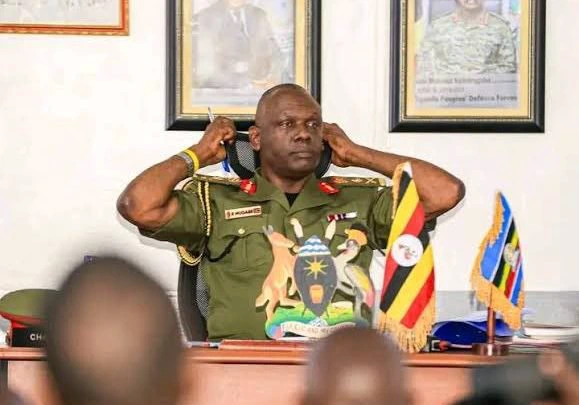Brig. Freeman Mugabe: Court Martial has Power to Prosecute Crimes Committed Outside Uganda

The General Court Martial sitting in Makindye, Kampala, has ruled that it holds the authority to prosecute crimes committed outside of Uganda.
The ruling follows a case where the military court’s jurisdiction was challenged by lawyers defending veteran opposition politician Dr. Kizza Besigye and his political ally, Hajj Obeid Lutale Kamulegeya.
The two who initially were charged with crimes related to illegal possession of firearms and ammunition had their charge sheet amended on Monday to add another charge of treachery.
The State also added a third accused person named Denis Ola, a serving UPDF officer attached to the armored brigade.
The crimes are alleged to have been committed in Switzerland, Greece, and Kenya.
On Monday, counsel for the State, Captain Raphael Mugisha, applied to amend the charge sheet by adding Captain Dennis Ola as the third accused person, and the application was allowed by the court.
When it came to plea taking, defense lawyers led by Kenya’s former Justice Minister, Martha Karua; Kampala Lord Mayor, Erias Lukwago; and Ernest Kalibala raised various objections, including that the General Court Martial has no territorial jurisdiction to entertain charges that were allegedly committed outside Uganda.
Defense lawyers also said that the charge sheet was defective because it was not in accordance with the UPDF Act by mentioning defense forces as not being clear to which defense forces were being referred.
They also argued that the way the accused persons were brought before the court did not follow the due process of the law.
Lukwago cited the case of Omar Awad Omar and 10 others versus Attorney General, consolidated constitutional petition number 55 and 56 of 2011, and submitted that the accused person was illegally brought from Kenya to Uganda, having been abducted.
He also said that sections 208 and 209 of the UPDF Act that appear to grant the court jurisdiction contravene articles 79 and 129 of the Constitution.
Lukwago prayed that the General Court Martial finds merit in the objection and discharges the accused person.
In reply, Counsel Raphael Mugisha for the State submitted that jurisdiction is a creature of the statute, and therefore section 208 of the UPDF Act gives jurisdiction to the military court to try the accused person.
He further submitted that the words defense forces are defined in the UPDF Act to mean Uganda People’s Defense Forces, and therefore the submissions of the defense team are misconceived and should be ignored by the court.
He also submitted that section 117 G on aiding and abetting and H on being found in a lawful position of arms or ammunition bring the accused person before the jurisdiction of the Court Martial.
Furthermore, he submitted that the accused person who was being brought was brought through the memorandum of understanding between Kenya and Uganda on an interstate arrangement on defense and security for offenders involved in committing or suspected to have committed serious crimes like terrorism, among others.
He further submitted that the constitutional provisions cited in the matter are not applicable: that is, Articles 23, 28, 126, 129, and 79.
RULING
The chairman of the General Court Martial, Brig. Freeman Mugabe, has ruled that the military court has jurisdiction to prosecute crimes committed outside of Uganda.
“This court, after listening to the submissions of both Counsel for the accused and the State, considered the relevant laws relating to this application and has deliberated on this application and finds as follows: that jurisdiction is a creature of statute, and section 208 of the UPDF Act gives powers to this court to try any person who has committed an offense in Uganda and outside Uganda. Two, that there is no defect in the charge sheet, because the accused is charged under Ugandan law, the UPDF Act, which clearly defines defense forces to mean Uganda People’s Defense Forces,” he ruled.
On the submissions that the accused person was abducted and brought to Uganda without following due process, Mugabe said that the court finds that there is no extradition treaty between Uganda and Kenya that was breached.
“To the contrary, this court finds that the accused being brought to Uganda through a memorandum of understanding between Uganda and Kenya on defense and security for persons suspected of having committed serious crimes did not amount to abduction. This Court has considered the consolidations of the Constitution Court in OMar Awad Omar and others, which was cited by counsel for the accused from paragraph 25 on page 63 to page 74 of the judgment, and entirely agrees with the court,” Mugabe ruled.
On the submissions that section 208 and 209 of the UPDF Act that appears to grant the military court jurisdiction, contravenes articles 79 and 129 of the Constitution, Mugabe ruled that the military court finds that it is not true.
“Having addressed itself to the provision of Articles 79 and 129 of the Constitution, this court finds the cited articles not applicable in this application and finds that this court has jurisdiction in the case. Accordingly, the objections raised are hereby dismissed, and the accused person should take a plea. We so rule,” Mugabe read the ruling.



0 Comments